Tips for choosing a work apron
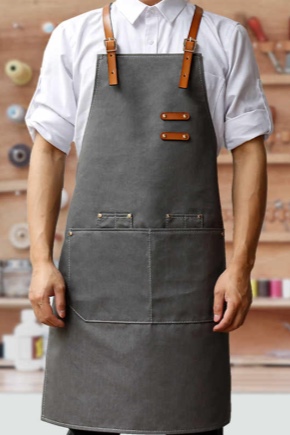
Representatives of many professions wear an apron as workwear. What are these products and how to choose them - we will consider in this article.


What are they for?
Aprons are a type of workwear. Work aprons are fixed on the belt, and for more comfortable operation they often have a neck loop. This loop, in turn, is fixed on the breast cut, which has 1 or 2 pockets. Aprons are an indispensable and indispensable element of a set of overalls for many specialists (for example, builders, doctors, cooks, as well as everyone who works with open fire). The main function of the apron is protective. This product protects clothing, as well as the skin and body of employees from harmful chemicals, dust, dirt, shavings, fire and sparks.
Usually, These are aprons for the workshop or production. They are denser, more massive. Also, the apron allows for a sterile working environment. This is important for people working in the catering sector, in medical institutions, laboratories. Finally, an apron is a part of the corporate style, an opportunity for employees to feel like a single working mechanism.
Wearing a uniform has been shown to increase work morale and discipline. And if the company logo is also applied to the apron, then this can work to increase brand awareness and serve other purposes of the advertising campaign.



Views
According to the method of use, aprons are disposable and reusable. Disposable products are used to protect employees and ensure sterility conditions in medical institutions, laboratories, pharmacies, canteens, as well as in everyday life.
Depending on the purpose, aprons can be made of different materials.


Tarpaulin
Tarpaulin is characterized by fireproof and moisture-repellent properties. This makes it a popular material for sewing aprons for welders. However, it is important to remember that tarpaulin can become excessively hot and catch fire if exposed to prolonged heat. Periodic shaking off of the scale during operation will help to avoid this. Tarpaulin aprons are used for short-term welding.
Such products, in turn, are subdivided into those that have a special impregnation and do not have it. Flame retardant aprons have a higher fire resistance, so heat protection is more reliable.


Split
Split leather is natural leather, which is cut into several layers. A split apron with a bib is sewn for welders, foundry workers, metallurgists, as well as for representatives of other professions whose work is associated with open fire and high temperatures.
It protects against heat, sparks, abrasion and dirt. The material is quite dense, but at the same time soft; products made from it are characterized by affordability. It is worth noting the durability of the split - it is difficult to break and even pierce it. The disadvantage is the need to use a protective suit.


Leather
Leather products are characterized by increased protective properties against scales, sparks, splashes. This is due to the high density of the material. However, this fact also has a downside - the material has low air permeability, which can lead to overheating of the worker, discomfort during operation.


Nappa
A variety of leather aprons. The material is a cattle hides covered with a special protective paint. Thanks to this, the product acquires increased refractory characteristics, does not heat up. The disadvantage is that such aprons are not easy to find on sale.
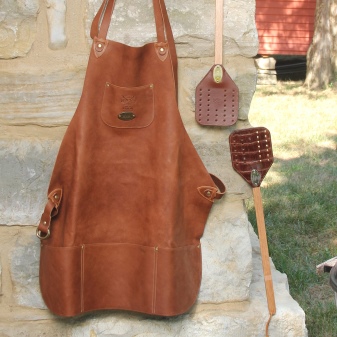

Suede leather
Suede products are suitable for long-term welding, but they also need to be shaken off from time to time. The material is characterized by resistance to heat, it quickly regains its properties and appearance after contact with water.

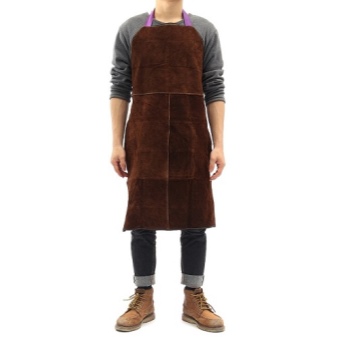
Rubber
Rubberized overalls are usually used by doctors, employees of chemical and other scientific laboratories. The material is resistant to aggressive chemicals, including acids. It does not absorb odors and is easy to clean.


Cotton fabric
Such aprons are used as overalls for cooks and other food service employees. Its advantages are high air permeability, washable. Often, such a uniform is made in different colors (for example, in accordance with the style of the institution or the corporate colors of the brand), has the company logos sewn on.

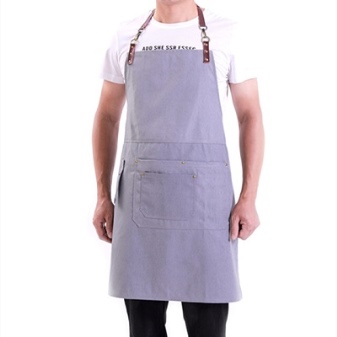
The materials described are used for sewing reusable aprons. If we are talking about disposable products, then other options are already used.
Polyethylene
The products are suitable for short-term, up to several hours, operation. They are moisture-proof, hypoallergenic, thermoplastic (retain their properties at elevated temperatures), protect from chemical attack and do not require special disposal conditions. but Due to the air tightness, working in an apron can be uncomfortable.
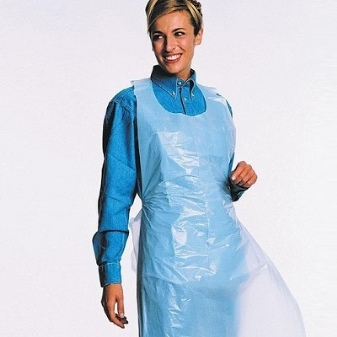

Polyvinyl chloride
The material is recommended for sewing aprons for employees of the chemical and medical fields, since it is not afraid of the effects of acids and alkalis, resins, oil products. With a thickness of 100 microns, polyvinyl chloride is more resistant to mechanical damage than polyethylene.


Spandbond (laminated spunbond)
The material does not allow moisture and bacteria to pass through, but is completely breathable. This allows it to be used for many hours of work in the laboratory, which provides employees with convenience and safety.
The material is resistant to chemical and physical attack, and thanks to the smooth sliding surface, dirt can be easily wiped off this apron. The material is hypoallergenic, which is also its advantage.


Selection criteria
When buying an apron, it is important to make sure that the product meets the requirements. The most stringent criteria are for aprons of metallurgists, welders. Products should not be afraid of open flames and high temperatures. Naturally, the apron should be selected taking into account the specifics of the work. So, for example, if a welder can use a tarpaulin apron without impregnation, then this is unacceptable for a metallurgist. For them, the product must have a special fire-resistant impregnation.
It is important that the product fits in size - it does not hinder movement, but it is not too loose. In most cases, it is more profitable to buy (sew to order) a set of an apron and protective oversleeves. Pay attention to the quality of sewing - the lines should be even, and the material should not knit.
Evaluate the reliability of the fittings fastening. The presence of pockets is not regulated by standards, but when they are, it is convenient.


In general, any product must meet the following criteria:
- convenience - this directly affects the safety of the work process and employee productivity;
- functionality, that is, full compliance of workwear with working conditions;
- wear resistance;
- ease of care, use of non-creasing fabrics, neat appearance - these qualities are of higher priority for fabric products.


For information on how to sew an apron for welding, locksmith and carpentry with your own hands, see the next video.













The comment was sent successfully.